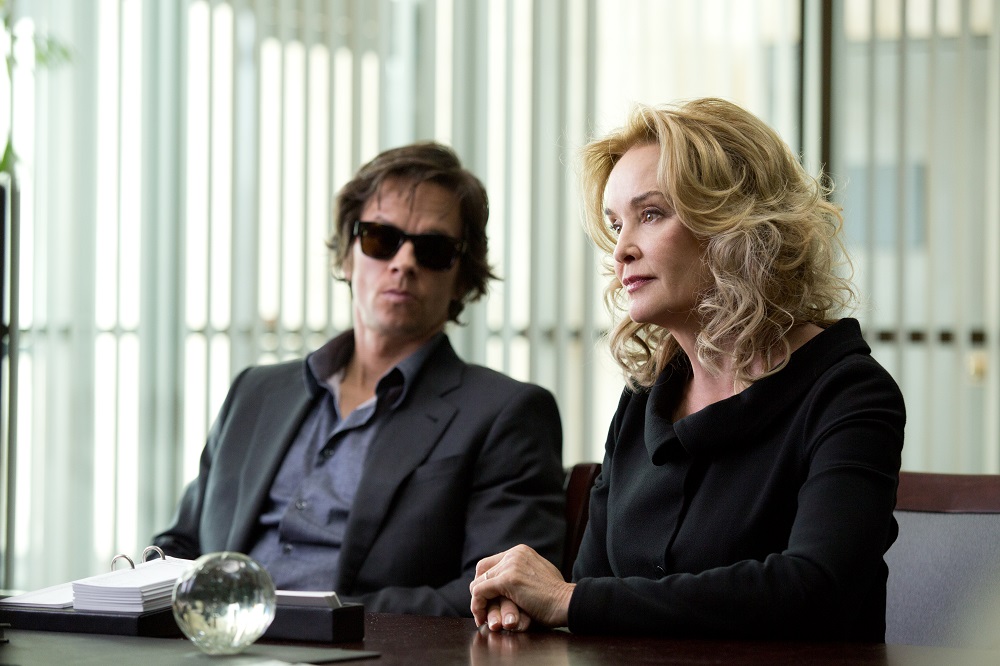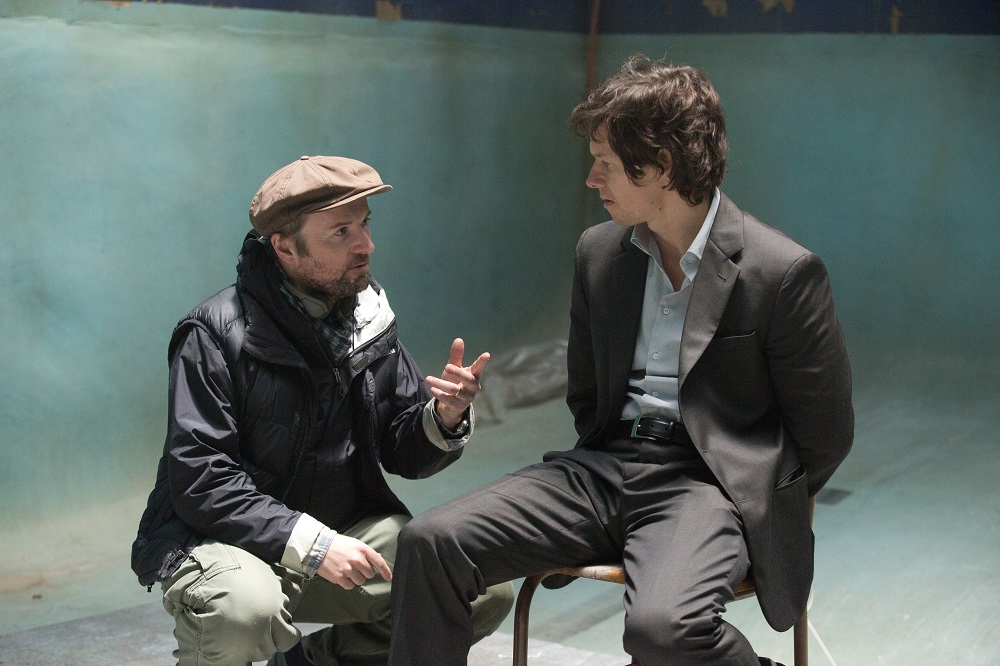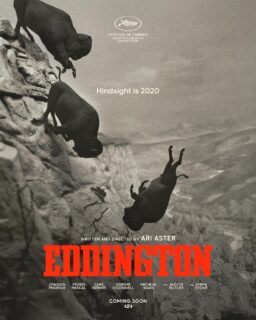In the
wake of the mammoth commercial and critical success of his last film, the 2011
franchise reviver “Rise of the Planet of the Apes,” British filmmaker
Rupert Wyatt was in a position where he presumably could have signed on to any
sure-fire tentpole epic guaranteed to become a cash cow. He chose to take a
gamble with a smaller and riskier proposition with his latest effort, the dark
drama “The Gambler.” In this loose remake of the 1974 film directed
by Karel Reisz from a powerful debut screenplay from perennial iconoclast James
Toback, Mark Wahlberg (in a role previously essayed by James Caan) stars as Jim
Bennett, a man who seems to have everything one could possibly ask for—wealth, privilege and a respected position as a literature—and yet is compelled by some self-destructive urge to
literally throw it all away via a
fascination with high-stakes gambling that finds him betting (and often losing)
the equivalent of an average yearly salary on a single role of the roulette
wheel. As a result of this habit, he is now permanently alienated from his rich
mother (Jessica Lange), owes huge sums of money to a gangster (MIchael K.
Williams) who will not hesitate to kill him if he is not repaid tries to
convince another loan shark (John Goodman) to loan him even more money to keep
going. His self-destructive urges even spill over into his personal life when
he begins a relationship with a student (Brie Larson) who knows of his secret
life and who just might be able to help him find himself at last–presume that
he hasn’t already destroyed himself before then.
Recently,
Wyatt came to town to promote “The Gambler” (which opens December 25)
and sat down to discuss the film, the aspects that separate this version from
the original and the challenges of getting an adult drama through the
contemporary studio apparatus.
After having done a film like “Rise of the Planet of
the Apes,” which was a large-scale work with tons of visual effects, did
you deliberately set out to find something on a smaller and more personal scale
like “The Gambler” as your follow-up project?
RUPERT
WYATT: Yeah, of a sort. It is funny because making “Apes,” even
though it was technically a big studio movie, was actually a small movie in
many ways—very often, we were shooting a
father and son in this house or just Caesar for most of the first two acts. As
part of the filmmaking process, I was keen to try something that would
challenge me as a filmmaker and do something that was less genre-driven, less
cause-and-effect and more character driven. For better or worse, I felt as a
filmmaker that I needed to do that rather than to go right into another
tentpole. Making a film like this allows you to focus on the character and the
situation and tell the story in that way.
I had
sort of left the “Apes” franchise with the idea of doing something of
my own like I had done with my first movie, which I co-wrote with Daniel Hardy.
We had ambitions to do something but it was taking a while to get going. This
script, I knew about and had heard about through my agent and Mark’s agent, who
kept telling me that I had to read the script. Eventually I read it and fell in
love with the writing. The way that Bill Monahan writes is really unique for a
studio movie because he writes about situations and character and it was great
for me as a filmmaker to try and bring my genre sensibilities. I love taking high-concept genre filmmaking
and trying to subvert it.

How familiar were you with the original version of
“The Gambler” before signing on to do the remake?
I was
very familiar with James Toback’s work and that of Karel Reisz, who I think is
a really underrated and under-appreciated filmmaker, but I never came to this
project with the notion of remaking the original. I read the script early on
and realized that this was a film that was less about a man’s addiction, which
is what I think the original one was about in coming from James Toback’s
personal experiences. I never wanted to emulate that because I didn’t feel
equipped to do that—I am not an addictive
personality nor am I much of a gambler. When I read Bill’s script, I saw that
it was not about addiction—this was the story of a man
who was using gambling as a means for getting out of his existence and to strip
away the gilded cage in which he was brought up. Society had placed a set of
rules upon him and he uses gambling to blow all that up and go back to zero. I
thought that was an interesting notion and very different from the original.
That is the the key difference that I noticed while
comparing the two films. In the original, James Caan goes from one bet to the
next and hardly seems to notice whether he is winning or losing. Here, the Mark
Wahlberg character is far more consciously self-destructive and not just in
regards to gambling–he goes out of his way to alienate the mother who appears
to be his only familial contact and initiates a relationship with one of his
students that could ruin his career if it was ever discovered. Was all of that
in the script that you were initially presented with or did this aspect develop
over time?
There
were a couple of scripts that had come my way that I was thinking about and had
actually entertained and I saw an opportunity to do something interesting that
wasn’t quite there in the scripts, as far as I was concerned. The trouble with
a lot of studio movies is that when they are green-lit, no one wants to change
them because then the green light can change to a red light. As a filmmaker, I
kind of promised myself that if I did someone else’s script, I really needed to
see it as I wanted to make it. When I read Bill’s work on “The
Gambler,” it was like buying a house—I could see all the rooms. I
didn’t set out to change anything.
You know
“Le Samourai,” the Jean-Pierre Melville film? To me, I always related
it to that—the idea of a samurai choosing
the place of his death. With Mark’s character, the opening scene is of him
seeing his grandfather on his deathbed and being asked “I need to know
what you would be worth if I leave you nothing.” In a way, that challenge,
that quest, is what sets Mark off on his path of self-destruction and that is a
tough sell for an audience. We are all conditioned, especially in moviemaking,
to get behind a character and root for him in the “Rocky” sense of
being an underdog but this is the story of an “overdog” who wants to become an underdog. That is not necessarily
the easiest guy to empathize with or support and it goes a long way to have
someone like Mark Wahlberg as the character because he is really such an
empathetic actor, which is what makes him a movie star, I guess. That was very
much a predestined journey that he chose to take rather than just being an
addict circling the drain who can’t help himself and who destroys the people
around him.

How difficult was it to try to get a project like this
through the contemporary big studio filmmaking process that tends to frown on
the very things that the film seems to be embracing?
It is all
about marketability and bankability. The honest answer to that is Mark Wahlberg—he is the guy who has a great deal of value. From my
perspective as a filmmaker, his value to me is his power and ability to play
his character and that is why I signed on. In terms of getting a green light
for this movie, he is a movie star and the budget for this movie combined with
his value as a star made it a worthwhile investment. You only have to look at
people like George Clooney or Brad Pitt, who are intelligent actors who use
their value well in the sense that they will do mainstream movies in order to
build up their value and then take it and put it into interesting projects that
are not necessarily easy sells. Mark did exactly that—he fell in love with the script, which is not what one
would consider to be a four-quadrant movie with a story for multiple
demographics, and decided to get behind it.
So Wahlberg was already involved with the project before
you signed on?
Yes. He
actually approached me. I had always wanted to work with him and that is
ultimately what got me to read the script. Like I said, I was focused on my own
thing and in order to get anything done, you have to stay true to your thing
and as a result, I was pissing other things away. Then I heard that he was
insisting that I read the script and I finally took a look at it. He was the
instigator of all of this.

Another key difference between the two versions is the
character played by Brie Larson. In the original, there was a girlfriend character
played by Lauren Hutton but she was just kind of there. The Larson character,
on the other hand, plays a more direct part in the proceedings in the sense
that she represents perhaps the one hopeful aspect of Wahlberg’s life and at
the same time, by being a student of his, she also has the potential to destroy
his life at the same time.
That is
one of the few characters from the movie that might have fallen through the
cracks. I think in the original, and this is just my perception of it, she is
just kind of this superficial arm candy. In our version, Amy is a very
different character—she is the cornerstone for his
redemption and is also blessed with this extraordinary talent that he alone
recognizes, hence the scene when he calls her out in class. They are kindred
spirits, you could say, so it is less of a Lolita relationship, even though she
is half his age, and more a case of someone who sees the world in the same way
that he does. If I had the time to do it again, I would have probably spent more
time focusing on making her character more understandable in that context but
when you have an actor like Brie Larson, it is amazing because she can take
what is pretty much a two-dimensional role and really make it into something.
Two of the most striking performances in the film are the
ones by Jessica Lange and John Goodman as, respectively, Wahlberg’s embittered
mother and a loan shark—they are only on
the screen for a few minutes each but their appearances are so vivid that it
feels as if their parts are larger than they actually are.
Well, the
thing that I learned is that when you are dealing with an ensemble or with any
supporting roles is that the better actor that you get, the more often you have
to flesh out the character in order to take advantage of their intelligence and
abilities as an actor so that they can take a small role and make it into
something much bigger just because of their very presence. With Jessica and
John and Michael Williams, they became the front-and-center characters in their
particular scenes. The way Bill wrote it, they always had the floor while Mark
was more passive and receptive in the situations that he found himself in with
them. It is an amazing opportunity as a filmmaker to work with actors like that
and the actors are drawn to it because of the writing.

What has the reaction been from the audiences at the
screening that you have been attending? As you alluded to earlier, the film is
about a character who is not the most easily empathetic person imaginable and I
can imagine that some might find it hard to accept someone that
self-destructive, especially when he is casually throwing away an average
person’s yearly salary on one roulette spin.
I don’t
know. I am the worst person to ask this question. I think you are right—when you are watching a character doing things that, at
least in the western sense, are really stupid and selfish and senseless by
taking something that could really change a person’s life and just tossing it
away so thoughtlessly, I can understand that people might turn away from him. I
think that what we tried to do is make sense of why this character was doing
that by showing that none of it meant anything to him–that it actually meant
something negative to him and that all of the wealth and privilege felt
inherently corrupt. I think that is something that is not necessarily a bad
thing–at the end of the day, this is only a movie and not a documentary–but I
think that it is a representation of something that we should all look at in
our lives at some time. Going for the more superficial aspects of our lives
does not always bring happiness–that was my intention to show and that is why
at the end of the film, he stands in front of a sign that says “Vacant
Lot.” He is a clean slate at the end, and, for me, that is quite
aspirational.
As we are talking towards the end of 2014, I was wondering
if you had any particular favorite films from the past year you would care to
mention.
I saw
“Force Majeure” recently, which I loved—I
thought that was an incredible film. It is funny because I think, more often
than not, that the filmmaking is so diverse and that is what was so wonderful
about it—it was the pauses and the
spaces in-between in that film that gave it such resonance. It really took its
time and it was really an amazing film. The sound design in that film was
great.
I have to
say that most of the things that I am loving at the moment are long-form things
on cable television, “The Knick” specifically. I recently watched
that back-to-back and loved that. I think some really interesting things are
happening on television right now. Oh, the movie that I really loved was
“Snowpiercer“! I love what happens when you go into a cinema and you
watch a film in that capacity and for me, it is a shame that the best
storytelling has migrated to television, though it is a great medium through
which to explore long-form storytelling almost like in a novel.












